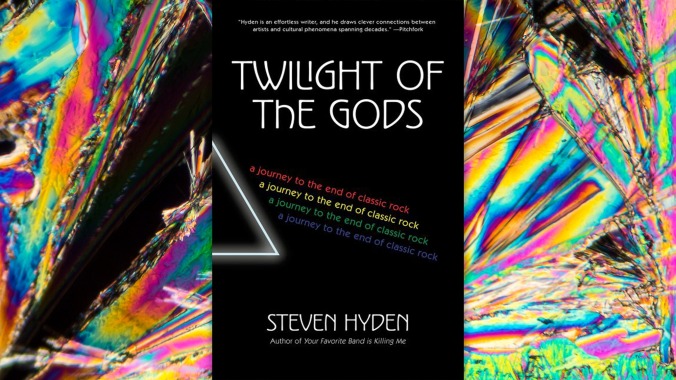The gods are dying. Snuffed out by old age, brittle-boned and weak of heart, too often done in by the very drugs that keep their geriatric bodies performing night after night. They are our leather-panted deities, our classic rock icons, the gods of the 20th century (Hollywood actors, it’s worth noting, are idols or stars, but never gods). Those who refused to burn out by the age of 27 are slowly fading away, day by day—Prince and Petty, Gregg and Butch, Chuck, Malcolm, Becker, and Fats—until, very soon, no gods will remain.
In Twilight Of The Gods, music critic Steven Hyden traces the rise, fall, and perilous future of classic rock and the mortal immortals who have made the amorphous genre so very classic. Ubiquity is the common thread, Hyden argues. There has been no escaping “Hotel California” since the single’s release in February 1977. Most every person on Earth can drop some trivia about the album Hyden calls classic rock’s first, the Beatles’ Sgt. Pepper’s Lonely Hearts Club Band (1967)—the cover, those costumes, the drug references, that damn Mr. Kite! Classic rock’s end arrives three decades later with Nine Inch Nails’ Fragile, Hyden argues in an odd, half-baked assertion that illuminates the mutuality of rock journalists and religious fundamentalists: the shared belief that my god is better than yours.
In what passes for structure, Hyden undertakes a hero’s journey, à la Joseph Campbell, through classic rock’s foundational myths. Our hero, a self-described “early-nineties alt-rock baby,” heeds the call to adventure (discovering Led Zeppelin and Pink Floyd), acquires mentors along his journey (Dylan, Springsteen), steps into the abyss (Aleister Crowley, groupies, a demented Bowie getting cozy with a bag of Berlin blow), and finds atonement (coming to terms with Prince’s death). This is all well-trod ground.
The book’s choicer cuts occur when our hero descends Mount Olympus to hang with the minor gods: interviewing Styx guitarist Tommy Shaw, who admits “Come Sail Away” owes a bit of its mega-success to doling out “fun-powder” and cash to disc jockeys; watching his mom repeatedly sing REO Speedwagon’s “Take It On The Run” following her recent divorce; and attending a music festival headlined by the Hollywood Vampires, a classic rock train wreck composed of Alice Cooper, Joe Perry, and, for reasons known to only the vainest of humans, Johnny Depp.
Hyden’s classic rock education is exhaustive. He’s listened to every bootleg, checked in at concerts by most every living god. As Dylan put it, he’s “very well read / It’s well known.” But something isn’t happening here, and we all know what it is: rock’s long-standing diversity problem.
Early on, Hyden admits that classic rock has long been the domain of white men—on stage, in the audience, and on the page—a dilemma he unfortunately never seeks to remedy. Naturally Jimi Hendrix receives some play here, and there’s a pilgrimage to the compound of the Purple One, but otherwise these gods remain as white as Bread. Women are most notably absent from his rock pantheon; Stevie Nicks and Christine McVie make a brief appearance, but where’s Janis, Joni, Ann and Nancy, Patti, Chrissie, and the Joans? It’s triply troubling that classic rock’s most influential gay artists, Elton John and Freddie Mercury, are entirely missing from Hyden’s journey (though he does apologize in the acknowledgments for their exemptions).
All journeys must come to an end, of course. Even gods must move on. Dylan will die. Bruce’s ass will begin to sag. And history’s greatest coupling will come to an end when one Glimmer Twin shuffles off his mortal coil before the other. We will cry, beat our breasts, and offer think-piece sacrifices in their names. The airwaves—if there are airwaves—will continue to blow our minds with songs we’ve heard countless times before, reminders that gods never die. We’ll sing stories about them, stories about seeing them live and in person, stories about how we used to dress and talk, drink and drug and fuck like the gods we wished we could be. It’s only rock ’n’ roll, nonbelievers will say, but we who worship the gods will know better.
Note: Steven Hyden is a former A.V. Club
writer.

 Keep scrolling for more great stories.
Keep scrolling for more great stories.
